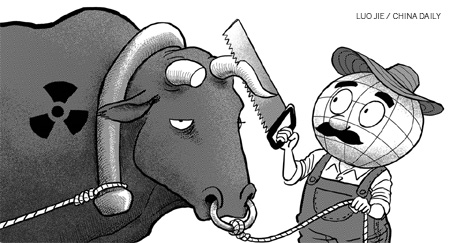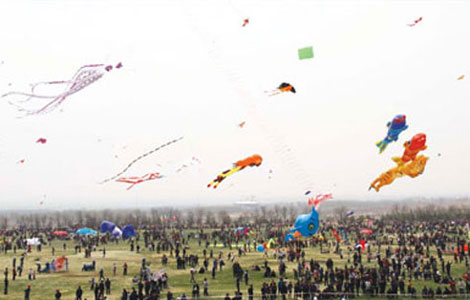Op-Ed Contributors
Nuclear safety must be our aim
Updated: 2011-04-29 07:56
By Ban Ki-Moon (China Daily)
That is why, visiting Ukraine for the 25th anniversary of the disaster, I put forward a five-point strategy to improve nuclear safety for our future:
First, it is time for a top to bottom review of current safety standards, both at the national and international levels.
Second, we need to strengthen the work of the International Atomic Energy Agency on nuclear safety.
Third, we must put a sharper focus on the new nexus between natural disasters and nuclear safety. Climate change means more incidents of freak and increasingly severe weather. With the number of nuclear facilities set to increase substantially over the coming decades, our vulnerability will grow.
Fourth, we must undertake a new cost-benefit analysis of nuclear energy, factoring in the costs of disaster preparedness and prevention as well as cleanup when things go wrong.
Fifth and finally, we need to build a stronger connection between nuclear safety and nuclear security. At a time when terrorists seek nuclear materials, we can say with confidence that a nuclear plant that is safer for its community is also more secure for the world.
My visit to Chernobyl was not the first time I have traveled to a nuclear site. A year ago, I went to Semipalatinsk in Kazakhstan, ground zero for nuclear testing in the former Soviet Union. Last summer in Japan, I met with the Hibakusha, survivors of the atomic blasts at Nagasaki and Hiroshima.
I went to these places to highlight the importance of disarmament. For decades, negotiators have sought agreement on limiting (and perhaps ultimately eliminating) nuclear weapons. And this past year, we have seen very encouraging progress.
With the memory of Chernobyl and, now, the disaster in Fukushima, we must widen our lens. Henceforth, we must treat the issue of nuclear safety as seriously as we do nuclear weapons.
The world has witnessed an unnerving history of near-accidents. It is time to face facts squarely. We owe it to our citizens to practice the highest standards of emergency preparedness and response, from the design of new facilities through construction and operation to their eventual decommissioning.
Issues of nuclear power and safety are no longer purely matters of national policy, alone. They are a matter of global public interest. We need international standards for construction, agreed guarantees of public safety, full transparency and information-sharing among nations.
Let us make that the enduring legacy of Chernobyl. Amid the silence there, I saw signs of life returning. A new protective shield is being erected over the damaged reactor. People are beginning to return. Let us resolve to dispel the last cloud of Chernobyl and offer a better future for people who have lived for too long under its shadow.
The author is the secretary-general
of the United Nations.

(China Daily 04/29/2011 page9)
E-paper

Blowing in the wind
High-Flyers from around the world recently traveled to home of the kite for a very special event.
Preview of the coming issue
Image maker
Changing fortunes
Specials

British Royal Wedding
Britain's Prince William and his girlfriend Kate Middleton get married on April 29.

Costly dream
Uninhabited havens up for lease but potential customers face wave of challenges in developing them.

Models gear up car sales
Beauty helps steer buyers as market accelerates.
